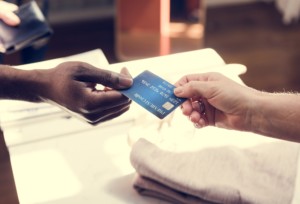A Look at the Pros and Cons of Using Credit Cards

Every day the mail seems to be brimming over with a new assortment of credit card offers. At the same time, we hear horror stories about the dangers of credit, so the vast majority of those offers end up being thrown away. But if they were such bad things, then surely nobody would ever get them, and the offers would stop. The truth is that they aren’t good or bad, in and of themselves, but knowing the advantages and disadvantages of credits will help you to make the best decision for you and your finances.
The never-ending flow of credit card offers can be overwhelming. On one hand, we hear horror stories about the dangers of credit, while on the other hand, we’re constantly barraged with advertisements for new credit cards. So, what’s the truth? Are credit cards good or bad? The answer isn’t so simple. To make the best decision for you and your finances, it’s important to understand the advantages and disadvantages of credit cards.
Advantages of Credit Cards
- Convenience – Credit cards are a convenient way to pay for purchases because they are accepted by almost every hotel, restaurant and retailer. You don’t have to carry any cash around, which adds an extra layer of convenience and safety. If you shop online, then a credit card is a must-have.
- Emergencies – Emergencies can happen at any time, so it’s important to be prepared. Have you saved enough money to cover a smaller emergency? What about a series of small emergencies, or a large emergency? It’s always better to be safe than sorry.
- Buyer protection – A credit card is a great way to protect your purchases. Most cards offer some type of buying protection, which can include a guaranteed refund, a chargeback, or an extended warranty. This can give you peace of mind when shopping, knowing that you’re covered if something goes wrong.
Disadvantages of Credit Cards
- Expense – Credit card companies provide a valuable service: helping you to easily and quickly purchase items without having to carry cash. However, they make their real money from the interest and fees they charge you. If you’re in the minority and pay your full balance every month, you’re missing out on some big savings. But if you’re in the majority and let your balance accrue interest, you’re really racking up the costs. The real expense comes from the compounding of the interest, and the fact that any fees are usually included in calculating the total amount of your interest.
- Temptation – When you have to reach into your pocketbook and pull out a crisp twenty-dollar bill to make a purchase, it feels much harder than handing over a plastic credit card. Studies have shown that people buy more things when they use credit cards; it’s as if that little piece of plastic has a hypnotic effect that causes people to give in to temptation.
- Debt – Credit cards are designed to put you into debt, but they do it in a way that’s sneaky. At first, it’s easy to pay more than the minimum amount due, and that gets you into the habit of using your credit card. Over time, your payments get closer to the minimum amount due, and eventually you will struggle to even pay that amount. Once you are late with a payment, even by one day, the penalties kick in and you are in real trouble. Your debt keeps going up, and it gets harder and harder to get out of it.
Credit cards offer a variety of advantages and disadvantages that can be confusing. Understanding these will help you use them properly and protect your finances.





